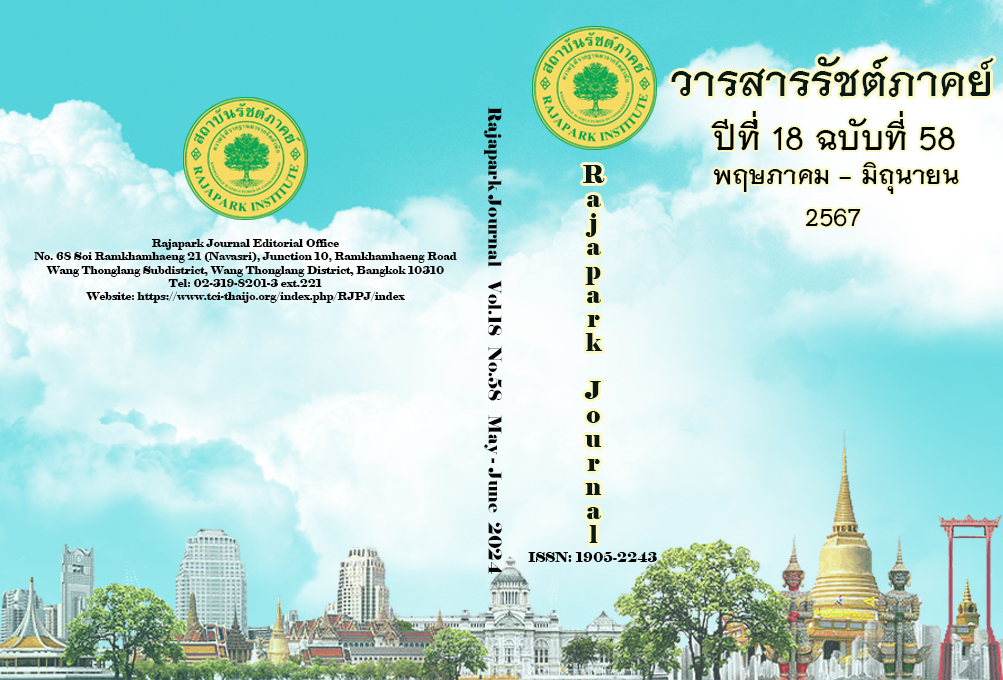Toward Integration of Museum-Tourism Destination Management in Thailand: A Qualitative Analysis of Employee Perspectives
Main Article Content
Abstract
This research aims to understand the satisfaction, needs, expectations, and concerns of the main stakeholders in the organization and to suggest management guidelines to improve the satisfaction, needs, expectations, and concerns of the main stakeholders in the organization. The findings of the workshop study, which involved 44 key informants chosen through a methodical sampling process as stakeholders in science and tourism museum organizations, may provide insight into how staff members relate to the operation in terms of their needs, expectations, and expressions of satisfaction, safety, occupational hygiene, and working conditions. The study found that there were differing opinions among the staff members regarding the organization's vision and mission. It also identified important problems regarding the museum's role in advancing scientific knowledge, disseminating scientific knowledge, promoting educational equity, and presenting museum tourism. The outcome suggested a set of management guidelines, such as 1) creating an inspiring environment that might satisfy the stakeholders and fulfill the intended goals; 2) work-life balance; 3) satisfaction improvement; 4) diverse skills promotion and development; 5) transparent leadership; and 6) effective communication channels.
Article Details

This work is licensed under a Creative Commons Attribution-NonCommercial-NoDerivatives 4.0 International License.
Views and opinions appearing in the Journal it is the responsibility of the author of the article, and does not constitute the view and responsibility of the editorial team.
References
Boukas, N., & Ioannou, M. (2020). Co-creating visitor experiences in cultural heritage museums: the avenue towards sustainable tourism development. International Journal of Tourism Policy, 10(2), 101-122. https://doi.org/10.1504/IJTP.2020.110862
Buryakov, D., Hino, A., Kovacs, M., & Serdült, U. (2022). Text Mining from Party Manifestos to Support the Design of Online Voting Advice Applications. In: 2022 9th International Conference on Behavioural and Social Computing (BESC), Matsuyama, Japan, 29 October 2022 - 31 October 2022. IEEE, 1-7.
Chawla, P. (2020). Impact of employer branding on employee engagement in business process outsourcing (BPO) sector in India: mediating effect of person–organization fit. Industrial and Commercial Training, 52(1), 35-49. https://doi.org/10.1108/ICT-06-2019-0063
Cheng, M. Y., & Brown, R. (2018). Employee satisfaction, customer satisfaction, and financial performance: An empirical examination. International Journal of Hospitality Management, 68, 20-28.
Dziuba, S.T., Ingaldi, M., & Zhuravskaya, M. (2020). Employee’ Job Satisfaction and their Work Performance as Elements Influencing Work Safety. CzOTO 2020, 2(1), 18-25.
ElDamshiry, K.K., & ElFouly, H. (2022). Open Air Natural History Museums Transformation: From static to interactive. Advanced Engineering Science, 54(2), 991-1005.
Hayat, A., & Afshari, L. (2020). Supportive organizational climate: a moderated mediation model of workplace bullying and employee well-being. Personnel Review, 50(7/8), 1685-1704. https://doi.org/10.1108/PR-06-2020-0407
Hsieh, Y.H., & Chuang, I_C. (2019). Evaluation of key factors for service experience: A comparison of tourism factories and international tourism hotels. Tourism Economics, 26(5). DOI:10.1177/1354816619840099
Ibrahim Abdullah, M. et al (2020). Effects of internal service quality on nurses’ job satisfaction, commitment and performance: Mediating role of employee well-being. Nursing Open, (8), 607–619.
International Council of Museums. (2022). Museum Definition. https://icom.museum/en/resources/standards-guidelines/museum-definition/
Jamal, B. A. et al. (2021). Hotel Service Quality: The Impact of Service Quality on Customer Satisfaction in Hospitality. IJEBM, 5(3). https://dx.doi.org/10.22161/ijebm.5.3
Jeong, Y., & Kim, S. (2020). A study of event quality, destination image, perceived value, tourist satisfaction, and destination loyalty among sport tourists. Asia Pacific Journal of Marketing and Logistics, 32(4), 940-960. http://doi.org/10.1108/APJML-02-2019-0101
Jiao, Y., & Li, Y. (2021). An active opinion dynamics model: the gap between the voting result and group opinion. Information Fusion, 65(2021), 128–146.
Kim, D.Y., & Park, S. (2020). Rethinking millennials: how are they shaping the tourism industry?. Asia Pacific Journal of Tourism Research, 25(1), 1-2. DOI: 10.1080/10941665.2019.1667607
Kim-Shyan F., Liat Cheng, B., Tat-Huei, C., Tan Chia Yi, M., & Ting, H. (2023). The role of cultural differences in Customer Retention: Evidence from the High-Contact Service Industry. Journal of Hospitality & Tourism Research, 1–32. DOI: 10.1177/10963480211014944
Martínez-Peláez, R. et al. (2023). Role of Digital Transformation for Achieving Sustainability: Mediated Role of Stakeholders, Key Capabilities, and Technology. Sustainability, 15(14), 11221. https://doi.org/10.3390/su151411221
Minh Loan, L.T. (2020). The influence of organizational commitment on employees’ job performance: The mediating role of job satisfaction. Management Science Letters, 10, 3307–3312.
Nishimura, N., Inoue, N., Masuhara, H., & Musha, T. (2020). Impact of Future Design on Workshop Participants’ Time Preferences. Sustainability, (12), 7796. DOI: 10.3390/su12187796
Nunkoo, R. (2018). The state of research methods in tourism and hospitality. Handbook of research methods for tourism and hospitality management, via free access, Robin Nunkoo – 9781785366277.
Punpeng, G. (2021). Thai Creative Industries in Flux. The ASEAN October-November 2021, 38-40.
Royal Thai Embassy, Washington D.C. (2019). Thailand building the largest museum in Southeast Asia. https://thaiembdc.org/2019/03/25/thailand-building-the-largest-museum-in-southeast-asia/
Shahzad, M. et al. (2022). Impact of stakeholders’ pressure on green management practices of manufacturing organizations under the mediation of organizational motives. Journal of Environmental Planning and Management. DOI: 10.1080/09640568.2022.2062567
ShawHong, S. (2020). Museums and Tourism: Reengineering the Role of Museums in Malaysia’s Cultural Heritage Tourism. Journal Becos (Business Economic, Communication, and Social Sciences), 2(1), 145-157.
Soliman, M., Al-Shanfari, L.S., & Gulvady, S. (2023). Sensory marketing and accessible tourism: An AI-generated article. Robonomics: The Journal of the Automated Economy, 4(53), 1-25.
Srisuk, N., Chanthasaro, P.A.S., & Rujjanapan, B. (2022). The Community Museum Prototyping in Electronic System. Journal of Buddhist Studies, 13(1), 140-159.
Vrontis, D. et al (2021). Sustainable Development in Tourism: A Stakeholder Analysis of the Langhe Region. Sage Journals, 46(5), https://doi.org/10.1177/1096348020982353.
Zbuchea, A., & Bira, M. (2020). Does Stakeholder Management Contribute to a Museum’s Sustainable Development?. Management Dynamic in the Knowledge Economy, 8(1), 95-107.


